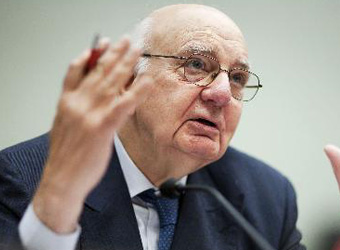Former Federal Reserve Chairman Paul Volcker, the namesake of U.S. rules designed to rein in banks’ proprietary trading, proposed another regulatory overhaul: this time, regarding supervision of global capital flows.
“This is a subject that has been basically ignored for 20 or 30 years now, ever since the breakdown of the Bretton Woods system,” Volcker said in an interview with Bloomberg Television in Hong Kong today. “Behind this immediate crisis of the financial system, the weaknesses in the international monetary system have left these huge imbalances going on and on.”
A new framework is needed to apply “discipline” against the types of imbalances that swelled between the U.S. and China in recent years, with excess American consumption financed by surplus Chinese saving, Volcker said. Since the 2007-2009 global credit crunch, world financial regulators have focused instead on capital adequacy and risk management at banks.
The world’s most-traded currencies have been set mainly by markets since the postwar Bretton Woods system of fixed currencies broke down in the early 1970s. Volcker, 84, witnessed the collapse when he was at the U.S. Treasury Department in 1973. He later went on to helm the Fed from 1979 to 1987.
Volcker also said in the interview that JPMorgan Chase & Co. (JPM) Chief Executive Officer Jamie Dimon’s membership on the Federal Reserve Bank of New York’s board of directors created “an appearance of a problem.” He said European policy makers should be more decisive and must safeguard the stability of Spain and Italy. The Fed will need to “pull more rabbits out of the hat” if the euro crisis affects U.S. activity, he said.
The global monetary and financial system hasn’t maintained financial stability as well as the Bretton Woods system and needs to be reformed, according to a Bank of England research paper published in December.
“We need some system to employ a little discipline so that you don’t have China running trillion-dollar surpluses or the U.S. is running a $5-trillion deficit,” said Volcker, who is scheduled to deliver a speech at a conference organized by the Fung Global Institute later today. “They are both happy doing it. They both thought it was in their individual interest but until it breaks down and when it breaks down, you have a big problem.”
China’s foreign-exchange reserves have almost doubled over the past four years, reaching a world record $3.3 trillion at the end of March, central bank data show. The increase stems from trade surpluses and China’s efforts to stem appreciation in the yuan, a policy that’s prompted the European Union and countries including the U.S. to accuse it of giving exporters an unfair advantage.
Europe’s debt crisis is in its third year and the specter of Greece leaving the euro area has stoked concern the turmoil may intensify, imperiling global growth and undermining financial markets. The nation holds a second election on June 17, following an inconclusive vote this month that buoyed a group opposed to an international bailout seeking to keep Greece in the euro region.
About 386 billion euros ($479 billion) in aid commitments for Greece, Ireland and Portugal, the establishing of a larger rescue fund as well as 214 billion euros in bond purchases and more than 1 trillion euros in cheap bank loans from the European Central Bank have failed to placate investors.
“The wall has not effectively been built as strong enough at this point,” Volcker said today. “Time is passing, it’s very important to protect Spain and Italy in particular. You wish they could be a little more decisive. When Europe has a problem, so does the world.”
In the U.S., Volcker said banks are in a “last-ditch fight” to soften a rule named after him that might crimp their profits.
The Fed, Securities and Exchange Commission and Federal Deposit Insurance Corp. are among regulators drafting the Volcker rule to limit bets banks can make with their own funds. JPMorgan, with other Wall Street banks including Goldman Sachs Group Inc. and Morgan Stanley (MS), have lobbied regulators to expand exemptions included in a draft proposal released last year.
The Volcker rule allows banks to continue activities that are considered hedging, as well as to serve as market-makers, accepting risk or holding shares of trades to facilitate client orders. It was included in the 2010 regulatory overhaul as a way to keep banks from putting federally insured deposits at risk, Bloomberg reported.
